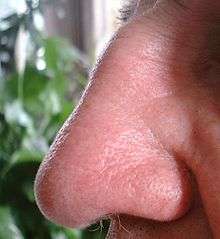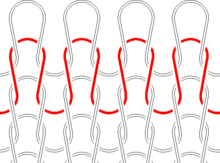코
| ||||||||||||
Korean
Pronunciation
- IPA(key)[kʰo̞]
- Phonetic Hangul[코]
|
See also
- 비호흡 ― bihoheup ― nasal respiration
- 비음 ― bieum ― a nasal sound[voice]
- 비모음 ― bimo-eum ― nasal vowel
- 부비강 ― bubigang ― sinus
- 비염 ― biyeom ― rhinitis
- 이비인후과(耳鼻咽喉科)
- ibiinhugwa
- Otorhinolaryngology
This article is issued from
Wiktionary.
The text is licensed under Creative
Commons - Attribution - Sharealike.
Additional terms may apply for the media files.

